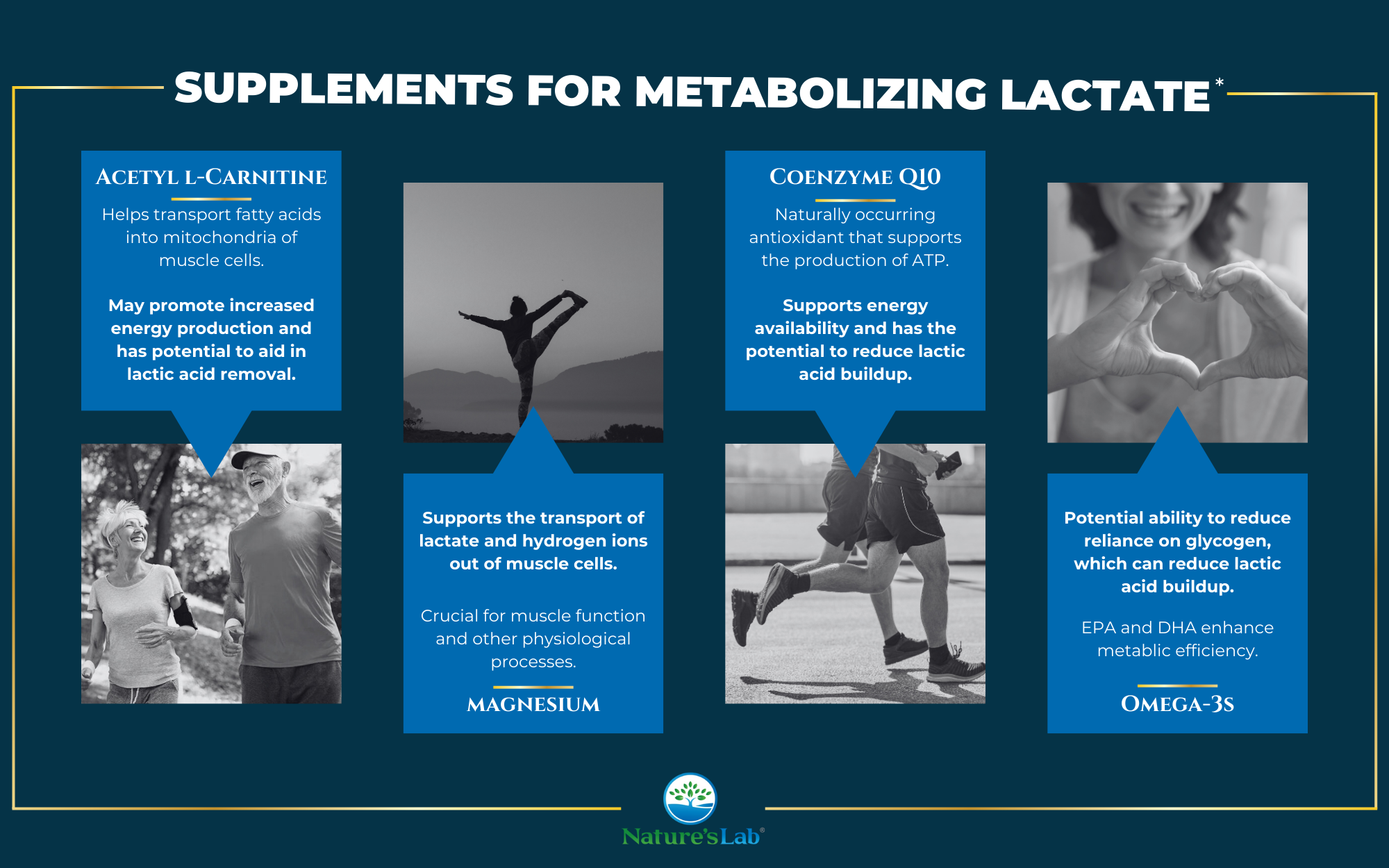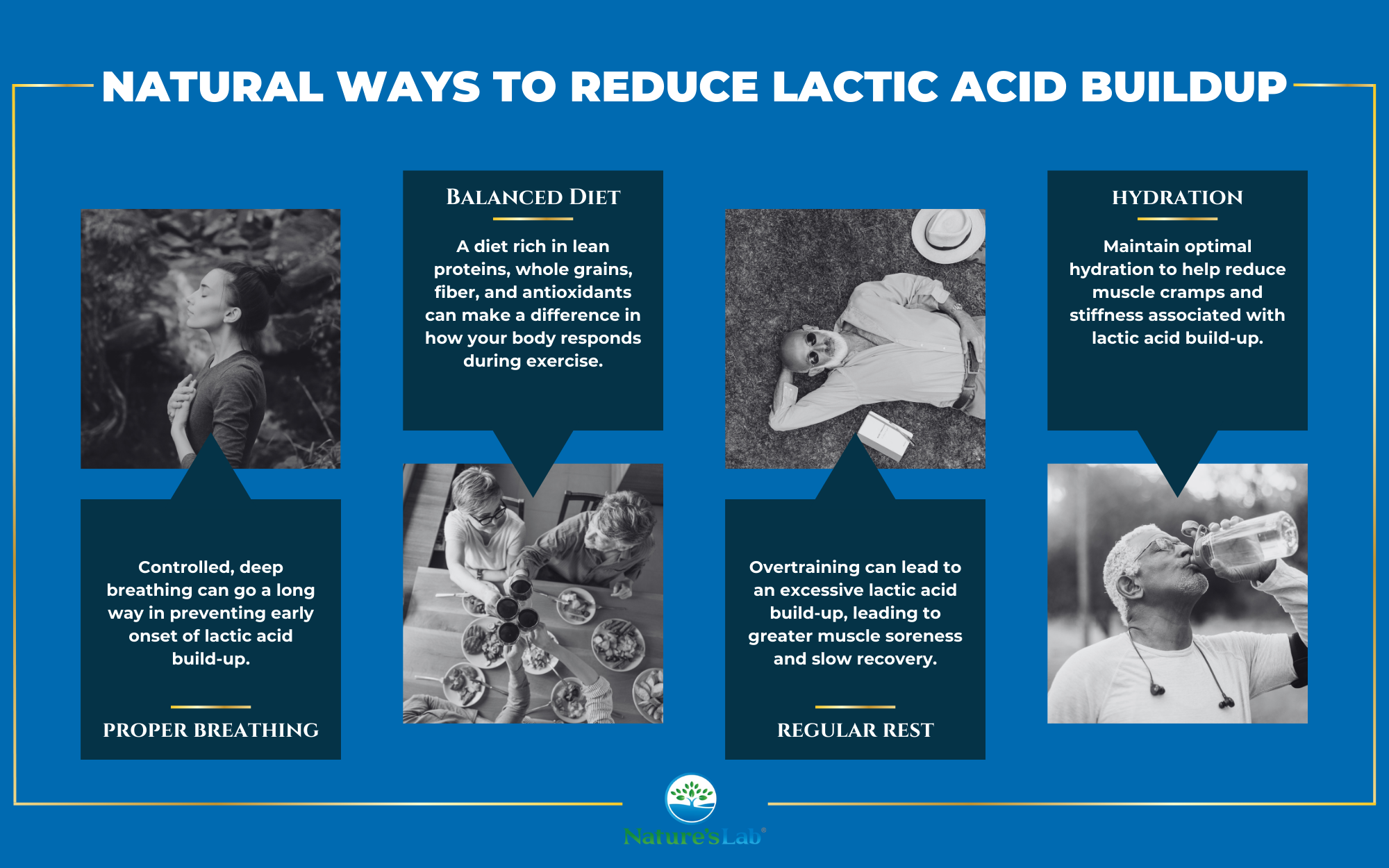“Though supplements aren’t a cure-all for lactic acid buildup, supplementation along with proper nutrition and exercise can work synergistically with your body to decrease the negative effects of lactic acid buildup in the body. Supplementation of Omega-3s, CoQ10, magnesium, and Acetyl L-Carnitine may help reduce lactic acid buildup in the muscles.”
GUIDE
Understanding Lactic Acid and Buildup
Have you ever wondered what causes the stiff, burning sensation in your muscles after, or even during, an intense workout? It comes from something called lactic acid buildup, a byproduct of strenuous exercise. This is just one small part of the complex physiological processes involved.
Lactic acid, contrary to a widely held belief, isn't a harmful metabolic waste product that athletes have to learn to cope with. In reality, this organic compound plays a crucial role in muscle energetics. Lactic acid ultimately converts back into an essential energy source - lactate. This process kicks in when the rate of demand for energy is faster than the body's ability to produce it.
The Physiological Process Behind Lactate Build-Up
Why does the body produce lactic acid? That question brings us to the lactate threshold - the exercising intensity at which lactic acid starts to accumulate in the blood faster than it can be removed. To put it simply, as you exercise, the oxygen available to your muscle cells decreases, causing your body to switch to anaerobic respiration. By providing a rapid energy supply to muscle cells, the body allows us to continue exercising at a high intensity for a short period. This process, although effective at providing immediate energy, results in lactic acid production.
When lactic acid builds up in your muscles faster than your body can clear it out, it leads to the rapid accumulation of lactic acid, in turn causing a burning sensation and fatigue during intense exercise. Although it might sound scary, this build-up isn't particularly dangerous unless under extreme circumstances leading to a condition known as lactic acidosis.
Ultimately, lactic acid is a natural byproduct of our body's chemical processes. Understanding the function of lactic acid can help us approach the management of muscle soreness and fatigue in more intelligent, evidence-based ways.
Your Body Actually Needs Lactic Acid
For a long time, this 'misunderstood' compound shouldered the blame for post-workout muscle soreness, but we now understand it as an invaluable part of your body's internal energy generation team.
The process of energy production in the muscles is the crux of this process - glycolysis, a metabolic pathway where glucose is broken down to produce adenosine triphosphate (ATP).
ATP is the primary energy-carrying molecule in our bodies. It fuels the muscle contractions required for muscular performance during exercise. When you're breathing in ample oxygen, like when you're performing low-to-moderate intensity workouts, your body generates ATP through aerobic metabolism. The glucose breakdown that takes place during aerobic metabolism provides enough ATP to power your physical activity, without any lactic acid as a byproduct.
However, when you up the ante on your workouts, your muscles demand significantly more energy, forcing your body to shift to a quicker ATP production process - anaerobic metabolism. Under anaerobic conditions, such as during high-intensity exercise or when oxygen supply is low, muscle cells switch to anaerobic glycolysis for quicker, yet less efficient, ATP production. You guessed it, lactic acid is a byproduct of this process.
Anaerobic Glycolysis and Lactate Production
The generation of lactic acid is unavoidable during intense exercise and can sometimes culminate the well-known muscle burn and fatigue. Once carried back to the liver, lactic acid can be converted back into glucose and serve as a vital fuel source for muscle cells and other energy-demanding tissues, like the brain and heart. This process is also known as the Cori Cycle.
Rather than causing muscle soreness and fatigue, the burning sensation you experience during intense exercise and the slight soreness after is attributed to factors like microscopic tears in muscle tissue and the resulting inflammation in muscle fibers - and not directly to lactic acid.
If health is wealth and knowledge is power, then we have news for you.
Subscribe to our newsletter for the latest updates on our health products, special offers, and wellness tips.
Subscribe NowSupplements that Can Help Reduce Lactic Acid
Sometimes our bodies need a little help managing lactic acid. Dietary supplements can enhance your body's ability to buffer the increase in lactic acid levels during high-intensity workouts, thus improving your exercise performance.*
Supplements can be taken in an attempt to prevent or slow the decline in pH which is related to the dissociation of lactic acid into lactate and hydrogen ions. As a result, fatigue and performance may be effectively targeted.
- Acetyl L-Carnitine: Carnitine helps transport fatty acids into the mitochondria of muscle cells, promoting increased energy production and potentially aiding in lactic acid removal.
- Magnesium: Crucial for muscle function, magnesium assists in many physiological processes, including supporting the transport of lactate and hydrogen ions out of muscle cells.
- CoQ10: This antioxidant supports the efficient production of ATP during high-intensity exercise, supporting energy availability and potentially reducing lactic acid buildup.
- Omega-3s: Eicosapentaenoic acid (EPA) and docosahexaenoic acid (DHA) found in omega-3 fatty acids, enhance metabolic efficiency, reducing the reliance on glycogen and, therefore, potentially reducing lactic acid buildup.
Performance Improvement through Supplementation
The effectiveness of supplements can vary greatly depending on the type, dosage, individual physiology, and the conditions under which they are used.
Though supplements aren’t a cure-all for lactic acid buildup, supplementation along with proper nutrition and exercise can work synergistically with your body to decrease the negative effects of lactic acid buildup in the body. Supplementation of Omega-3s, CoQ10, magnesium, and Acetyl L-Carnitine may help reduce lactic acid buildup in the muscles.* It's advisable to always consult with a healthcare professional or a dietitian before starting any supplement regimen, particularly if you have underlying health conditions.
Natural Ways to Reduce Lactate Build-up
While dietary supplements can be highly beneficial in managing lactic acid build-up, there are lots of natural strategies you can implement to help the cause. Supplements perform optimally when combined with healthy lifestyle practices.
- Balanced Diet: A diet rich in lean proteins, whole grains, fiber, and antioxidants can make a considerable difference in how your body responds during intense exercise. Macro and micronutrients play key roles in equipping your body to efficiently metabolize lactic acid, promoting quick muscle recovery.
- Hydration: Maintaining optimal hydration levels is a known strategy for reducing muscle cramps and stiffness associated with lactic acid build-up.
- Proper Breathing: Rapid, shallow breathing often witnessed during high-intensity workouts can trigger a shift in your body's metabolic pathway, from aerobic to anaerobic. Controlled, deep breathing can go a long way in preventing early onset of lactic acid build-up.
- Regular Rest: Overtraining can lead to an excessive lactic acid build-up, leading to greater muscle soreness and slow recovery. It’s important to allow your body adequate rest and recovery time.
In addition to these lifestyle practices, there are natural compounds that can also contribute to reducing lactic acid build-up:
- Creatine: Known primarily for increasing energy production, creatine can also serve to buffer lactic acid build-up in your muscles during activity.
- Bicarbonate: Sodium bicarbonate, commonly known as baking soda, acts as a natural buffer in our bodies. There are mixed results on the effects on athletes when used for fatigue. According to a study by the NIH, the effects of sodium bicarbonate on performance or as a buffer are inconclusive.
Incorporating these strategies into your lifestyle and routine can be effective in managing lactic acid, mitigating muscle soreness, and improving exercise performance. A natural approach, when combined with supplementation, is the best way to aid your body in lactic acid management. An optimal combination of these practices will set a healthy, scientific foundation to successfully tackle lactic acid buildup and aid muscle recovery.
Fuel Your Body with Adequate Nutrition and Supplementation
The production of lactic acid is a necessary part of our metabolic processes. Moreover, its build-up is a natural physiological response to rigorous exercise. Lactic acid is not the culprit behind your muscle soreness, but an agent in your body's complex system of energy production and consumption.
Before introducing any supplement into your routine, it is important to consult with a healthcare provider, especially if you have any underlying health conditions. Tailoring your supplement intake to your needs is key to reaping its benefits.
At Nature's Lab, our products are designed to support the body’s natural processes. A healthy body is supported by healthy habits, so we recommend supplements alongside a healthy diet and regular exercise.
With an appropriate balance of a healthy lifestyle and effective supplements, you can create the optimal environment for your body to function at its best and reach your athletic peak. We are here to help you level up your athletic performance and overall well-being. Check out our full line of fitness and recovery supplements!
Works Cited
Cleveland Clinic. “Lactic Acidosis: Symptoms, Causes, Treatment & What It Is.” Cleveland Clinic, 13 June 2023, https://my.clevelandclinic.org/health/diseases/25066-lactic-acidosis.
Hadzic, Miralem, et al. “The Impact of Sodium Bicarbonate on Performance in Response to Exercise Duration in Athletes: A Systematic Review.” NCBI, 28 February 2019, https://www.ncbi.nlm.nih.gov/pmc/articles/PMC6544001/.
Lewis, Paul B., et al. “Muscle soreness and delayed-onset muscle soreness.” PubMed, NIH - PubMed, April 2012, https://pubmed.ncbi.nlm.nih.gov/22341015/.
NIH. “Cori Cycle.” PubChem, 29 January 2019, https://pubchem.ncbi.nlm.nih.gov/pathway/WikiPathways:WP1946#section=Information-Sources.
NIH. “Exploring the Relationship between Micronutrients and Athletic Performance: A Comprehensive Scientific Systematic Review of the Literature in Sports Medicine.” June 2023, https://www.ncbi.nlm.nih.gov/pmc/articles/PMC10302780/.
Oliver, Jonathan, et al. “Oral creatine supplementation's decrease of blood lactate during exhaustive, incremental cycling.” PubMed, June 2013, https://pubmed.ncbi.nlm.nih.gov/23164647/.
Rault, Aline, et al. “Fermentation pH Influences the Physiological-State Dynamics of Lactobacillus bulgaricus CFL1 during pH-Controlled Culture▿.” Pub Med Central, July 2009, https://www.ncbi.nlm.nih.gov/pmc/articles/PMC2704822/.
Rui, Liangyou. “Energy Metabolism in the Liver - PMC.” NCBI, 10 January 2014, https://www.ncbi.nlm.nih.gov/pmc/articles/PMC4050641/.






